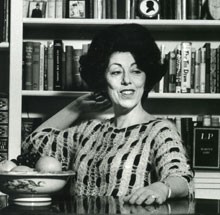Columbia University Libraries Acquires Papers of Writer Hortense Calisher
NEW YORK, October 19, 2009 – Columbia University’s Rare Book & Manuscript Library has acquired the papers of the noted American novelist and short-story writer, Hortense Calisher (1911-2009).

Calisher wrote fifteen novels, six volumes of short fiction, and three memoirs. A New Yorker for much of her life, she also lived in England at various times. In 1989 she received a Lifetime Achievement Award from the National Endowment for the Arts. Three of her books were nominated for the National Book Award and she received two Guggenheim Fellowships.
According to writer Cynthia Ozick: “When American writing of the twentieth century is summed up...Hortense Calisher will be seen to stand vividly with Cather and Fitzgerald. In the meantime, even before the Long Perspective, the body of her work (and the perfection of her prose) is here to complicate, enlighten, startle, and delight us.”
Calisher’s background, as with most writers, fed her writing. Her German Jewish mother emigrated to New York early in the 20th century, and her much older father was a Southern Jew whose family arrived a century before. “Jews have a pride of heritage, tradition, and tragedy,” she wrote. “So have Southerners, with different subject matter. Both are often anecdotalists, of humors peculiar to each –and run to large family gatherings .... The combination was odd all round, volcanic to meditative to fruitfully dull, bound to produce someone interested in character, society, and time.”
Calisher graduated from Barnard College in 1932, and worked as a waitress and in a department store during the Depression. In 1935 she married an engineer, Heaton Heffelfinger and settled in the Hudson Valley, where for years she wrote poetry. In 1948, her first short story appeared in The New Yorker, and in 1951 her collection of mostly autobiographical short stories, In the Absence of Angels immediately placed her among the leading new writers.
Her first marriage ended in 1958; she had two children. A year later she married the writer Curtis Harnack, whom she met at the Iowa Writers’ Workshop, and returned to living in Manhattan. Her first novel, False Entry was a finalist for the National Book Award in 1951.
About Tale for a Mirror, her much acclaimed second collection of short fiction, in 1962, Time said: “To be any good at all, short stories must be nearly perfect. These are.” Many of them were translated into languages of Europe, Asia, and Africa. Ann Tyler has said, “Her tales are a form of amber, sealing unforgettable moments in time, and Hortense Calisher is better at this sort of sealing than any other writer I know of.” One of them, “The Hollow Boy,” originally published in Harper’s, was later dramatized on PBS’s American Playhouse, with actors Kathleen Chalfont, Jerry Stiller, Alexis Arquette, and Kathleen Widdoes.
After that, novels and short story collections came at a prodigious pace, which did not slacken, even into her 90s. She published her last novel, Sunday Jews in 2002, “an old-fashioned family saga, with plot twists worthy of George Eliot’s Daniel Deronda,” according to The New York Times Book Review. Her final work was a memoir, Tattoo for a Slave, in 2004.
In addition to writing, Calisher taught at more than a dozen universities, including Brown, Penn, Columbia, Stanford, and the University of California, where she was a Regents professor. She was active in professional organizations such as Human Rights Watch and served as president of both PEN American Center and the AmericanAcademy of Arts and Letters.
Calisher’s papers run to more than one-hundred linear feet and include all of her published and unpublished work. There is a voluminous correspondence with writers, editors, and critics, as well as notebooks, diaries, audio and visual material. Of the many photographs, some dating to the 19th century, identification is in Calisher’s hand. The manuscripts, especially from the early years, reveal remarkably few revisions. She reported having composed the first stories by memorizing the text as she walked her son to and from his first school.
When organized and processed, the collection will be available for research. For more information, please contact the RBML at (212)854-5153.
The Rare Book and Manuscript Library owns over 500,000 rare books in some 20 book collections and almost 28 million manuscripts in nearly 3,000 separate manuscript collections. It is particularly strong in English and American literature and history, classical authors, children’s literature, education, mathematics and astronomy, economics and banking, photography, the history of printing, New York City politics, librarianship, and the performing arts. Individual collections are as eclectic as they are extensive.
Columbia University Libraries/Information Services is one of the top five academic research library systems in North America. The collections include over 10 million volumes, over 100,000 journals and serials, as well as extensive electronic resources, manuscripts, rare books, microforms, maps, graphic and audio-visual materials. The services and collections are organized into 22 libraries and various academic technology centers. The Libraries employs more than 550 professional and support staff. The website of the Libraries at www.columbia.edu/cu/lweb is the gateway to its services and resources.